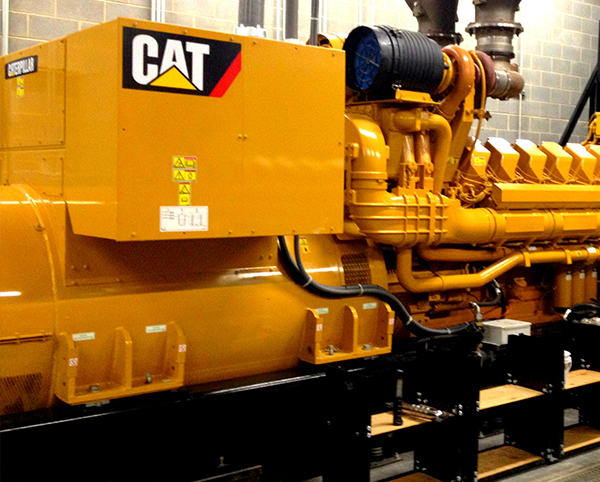
Specific benefits of timely industrial and backup generator planned maintenance practices include:
- Identifying potential issues before they become costly problems.
- Monitoring the condition of critical parts to detect signs of wear and tear.
- Enabling your power generation systems to run more efficiently.
- Gaining more control over your operating and repair costs, allowing you to estimate your expenses more accurately and budget effectively.
While you can perform some backup and industrial generator maintenance practices yourself, others are more complex and require professional service to ensure correct and safe execution.
Jump to sections:
- Do-it-Yourself (DIY) Industrial and Backup Generator Maintenance Tips
- Carolina Cat Knows How to Maintain an Industrial Generator
- Get More Industrial Generator Maintenance Tips or Schedule a Service Appointment
Do-it-Yourself (DIY) Industrial and Backup Generator Maintenance Tips
Follow these general steps to keep your equipment in peak operating condition and detect potential signs of trouble.
Daily Service
Each day, conduct a cursory visual inspection of your generator. Items to check include oil and coolant levels and the condition of the water pump belt, alternator and transfer switch. Also, look underneath the unit for signs of leaks.
Weekly Service
Once a week, run your generator at the no-load setting to verify that it operates with no alarms or warning signals. Then, inspect the battery charger and check to make sure there are no loose wires or faulty connections.
For more in-depth service on your commercial or industrial generator see the maintenance tips below.
Professional Commercial and Backup Generator Maintenance Tips
While DIY generator service can help prevent many common mechanical and operational issues, your generator will likely require expert attention as it ages. While the nature and scope of the service depend on factors such as the unit’s make and model, age and frequency of use, there are several areas a professional technician will focus on during an annual or biennial inspection. These include the engine, fuel system, exhaust system, control system and electrical system.
A professional inspection can detect and help to prevent a wide range of problems such as:
- Pump system malfunctions that can cause the generator to run out of fuel.
- Block heater wear and tear that prevents the proper heating of coolant.
- Battery failure — a typical industrial generator battery lasts approximately four years.
- Fuel leaking back into the tank.
Annual Service
Your annual generator maintenance plan should consist of changing the engine oil and filter. The technician should also replace the unit’s air and fuel filters. Additionally, the tech should perform a more in-depth inspection of the alternator and transfer switch and take appropriate maintenance and troubleshooting steps as needed.
Biennial Service
Every two years, a professional tech should examine the unit’s enclosure for signs of damage and other key areas such as the coolant heater, lines and connections, air induction piping and the electrical system, control panel and accessories. The tech should also check and clean the air cleaner units and inspect the fuel system for leaks.
Triennial Service
Every three years , a professional tech should examine the unit for signs of damage and other key areas such as the coolant heater, lines and connections, air induction piping and the electrical system, control panel and accessories. The tech should also check and clean the air cleaner units and inspect the fuel system for leaks. Based on operations and maintenance guides drive belts, fan drive belts, batteries, coolant may be replaced at this time.
Carolina Cat Knows How to Maintain an Industrial Generator
Carolina Cat has the expertise to perform planned commercial backup generator maintenance that will keep your generators and other power system equipment in peak operating condition. Our technicians have the training and experience to perform all essential maintenance and repair tasks. Examples of our service offerings include fluid sampling and polishing, vibration analysis and thermography. We can also set up a technologically advanced remote monitoring program that tracks key generator metrics and delivers valuable performance data.
When you choose Carolina Cat for planned industrial generator maintenance, you increase the likelihood that your equipment will perform flawlessly and have a longer life span.
Get More Industrial Generator Maintenance Tips or Schedule a Service Appointment
Contact us for more helpful industrial and backup generator maintenance tips today. We’ll also be happy to schedule a convenient time for you to meet with a Carolina Cat representative and set up a planned maintenance schedule that makes sense for your business.